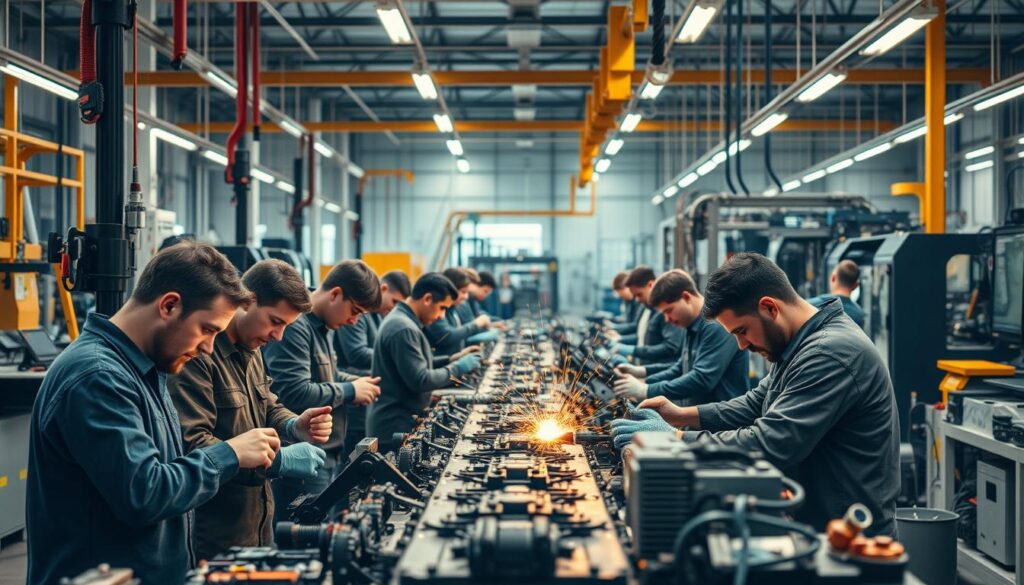The United States is on the cusp of a manufacturing resurgence, with a projected 500,000 new factory jobs expected to be created by 2025. This significant growth is a testament to the country’s efforts to revitalize its industrial sector.
You might be wondering what this means for you. As the US economy continues to evolve, this manufacturing comeback is expected to bring new opportunities and challenges. With 500k new factory jobs on the horizon, the USA is poised to strengthen its position as a global industrial leader.
Key Takeaways
- The US is expected to create 500,000 new factory jobs by 2025.
- This growth is driven by a resurgence in the manufacturing sector.
- New opportunities and challenges will arise from this industrial shift.
- The manufacturing comeback is expected to strengthen the US economy.
- Various industries are likely to be impacted by this trend.
The Manufacturing Comeback: Understanding the Resurgence
With a projected 500,000 new factory jobs coming to the USA in 2025, the manufacturing resurgence is gaining momentum. This significant growth is not just a statistic; it represents a fundamental shift in the American economy. As you explore the factors driving this change, you’ll discover a complex interplay of government policies, technological advancements, and evolving consumer demands.
Key Factors Driving American Factory Growth
Several key factors are contributing to the growth of American factories. Government initiatives, such as tax incentives and infrastructure investments, are playing a crucial role. Additionally, technological advancements in automation and AI are enhancing productivity and efficiency. Shifting consumer demands towards made-in-USA products are also driving this resurgence.
Economic Impact of 500K New Manufacturing Jobs
The economic impact of 500,000 new manufacturing jobs will be substantial. This growth will not only create new employment opportunities but also stimulate local economies through increased consumer spending. However, it also poses challenges, such as the need for workforce retraining and infrastructure development. As the manufacturing sector continues to grow, understanding these dynamics will be crucial for both policymakers and job seekers.
Breaking Down the New Manufacturing Landscape
The future of manufacturing is taking shape, and it’s crucial to examine the industries and regions leading this change. As the sector continues to evolve, various industries are driving the growth of factory jobs.
Industries Leading the Factory Job Growth
The new manufacturing landscape is characterized by a mix of advanced and traditional industries. Some of the key sectors driving job growth include:
- Transportation equipment manufacturing
- Food processing
- Electrical equipment production
Advanced Manufacturing Sectors
Advanced manufacturing sectors are at the forefront of innovation, with industries like electric vehicle production and renewable energy equipment manufacturing leading the charge. These sectors are not only creating new job opportunities but also driving technological advancements.
Traditional Manufacturing Opportunities
Traditional manufacturing sectors continue to play a vital role in the industry, with opportunities in areas like machining, welding, and quality control. These roles are essential to the production process and will continue to be in demand.
Geographical Distribution of New Factory Jobs
The geographical distribution of new factory jobs is not uniform, with certain regions experiencing more significant growth than others. States with existing manufacturing infrastructure, such as those in the Midwest, are seeing a resurgence in factory jobs. Additionally, areas with business-friendly policies and access to skilled labor are also attracting new manufacturing investments.
As the manufacturing landscape continues to evolve, understanding these trends will be crucial for both job seekers and industry stakeholders.
Essential Skills for Modern Factory Positions
Modern factory positions demand a unique blend of technical knowledge and interpersonal skills. As manufacturing continues to evolve, the need for workers who can adapt to new technologies and work collaboratively is becoming increasingly important.
Technical Skills in High Demand
Technical skills are crucial in modern manufacturing. Workers need to be proficient in areas such as automation and robotics.
Automation and Robotics Knowledge
Knowledge of automation and robotics is critical as factories become more technologically advanced. Understanding how to operate and maintain automated systems is a key skill.
Quality Control and Safety Protocols
Adhering to quality control and safety protocols is essential to ensure a safe working environment and maintain high product standards.

Soft Skills for Manufacturing Success
While technical skills are vital, soft skills such as teamwork, communication, and problem-solving are equally important. These skills enable workers to collaborate effectively and respond to challenges in the factory environment.
By focusing on both technical and soft skills, you can position yourself for success in the modern manufacturing landscape.
Educational Pathways to Manufacturing Careers
As you navigate the evolving manufacturing landscape, it’s essential to understand the various educational pathways available to you. The manufacturing sector is experiencing a significant resurgence, with 500K new factory jobs coming to the USA in 2025. To capitalize on this trend, you’ll need to acquire the right skills and training.
Trade Schools and Certificate Programs
Trade schools and certificate programs offer specialized training in areas like CNC machining, welding, and industrial maintenance. These programs are typically shorter than traditional degree programs, lasting from a few months to two years. They provide you with hands-on experience and the specific skills employers are looking for in the manufacturing sector.
Community College Manufacturing Programs
Community colleges offer a range of manufacturing programs, from associate degrees to certificate programs. These programs often combine theoretical knowledge with practical training, preparing you for roles in manufacturing supervision, quality control, and more. Many community colleges also have partnerships with local manufacturers, providing you with potential job opportunities upon graduation.
Apprenticeship and On-the-Job Training Opportunities
Apprenticeships and on-the-job training programs allow you to learn while working, earning a salary and gaining valuable experience. These programs are often sponsored by manufacturers or industry associations, ensuring that you’re trained in the specific skills and technologies used in the field. You’ll have the opportunity to work alongside experienced professionals and build a network of contacts.
| Educational Pathway | Duration | Key Benefits |
|---|---|---|
| Trade Schools and Certificate Programs | Several months to 2 years | Specialized training, hands-on experience |
| Community College Manufacturing Programs | 2 years (Associate Degree) | Theoretical knowledge, practical training, industry partnerships |
| Apprenticeship and On-the-Job Training | Varies (1-4 years) | Earning while learning, industry-specific skills, professional networking |
Assessing Your Manufacturing Career Fit
As the manufacturing landscape evolves, it’s crucial to assess whether a career in this field aligns with your skills and aspirations. With 500K new factory jobs coming to the USA in 2025, understanding your fit for a manufacturing career can help you capitalize on these emerging opportunities.
Self-Assessment Tools for Factory Work Aptitude
To determine your suitability for a manufacturing career, utilize self-assessment tools that evaluate your technical skills, problem-solving abilities, and physical capabilities. Online quizzes and career assessments can provide insights into your aptitude for factory work. For instance, you can explore resources like career advice platforms that offer personalized guidance.
Matching Your Background to Manufacturing Opportunities
Consider how your existing skills and experience can be applied to manufacturing roles. If you have a background in areas like logistics, maintenance, or quality control, you may find that your skills are transferable to factory positions. Highlighting your relevant experience and skills can make you a competitive candidate in the manufacturing job market.
By using self-assessment tools and matching your background to manufacturing opportunities, you can make an informed decision about pursuing a career in this field. This proactive approach will help you navigate the evolving manufacturing landscape with confidence.
Step-by-Step Guide to Upskilling for Factory Work
To succeed in the modern factory environment, you’ll need to identify your skill gaps and address them. The manufacturing industry is evolving rapidly, with new technologies and processes being introduced regularly. Upskilling is essential to remain competitive and secure a factory job.
Identifying Your Manufacturing Skill Gaps
Start by assessing your current skills and comparing them to the requirements of your desired factory role. Make a list of the technical skills needed, such as operating specific machinery or understanding manufacturing software. Consider your soft skills as well, like teamwork and problem-solving. Identify areas where you need improvement and prioritize them.
Free and Low-Cost Training Resources
Once you’ve identified your skill gaps, it’s time to find training resources. Fortunately, there are many free and low-cost options available.
Online Learning Platforms
Websites like Coursera, edX, and Udemy offer courses on a wide range of manufacturing topics. You can learn at your own pace and often earn certificates upon completion. For example, Coursera offers a Manufacturing specialization that covers key concepts in production.
Government-Sponsored Programs
The U.S. government offers various programs to support workforce development. The Workforce Innovation and Opportunity Act (WIOA) provides funding for training in high-demand industries, including manufacturing. Check with your local workforce development board to see what programs are available.
Creating Your Personal Development Plan
With your skill gaps identified and training resources in hand, create a personal development plan. Set specific, measurable goals for your training and timeline for completion. Regularly review and update your plan to stay on track. Consider finding a mentor in the manufacturing industry to guide you.

Finding Factory Job Opportunities
As the manufacturing sector continues to grow, with around 500,000 new jobs emerging in the U.S., finding the right factory job opportunity can be a daunting task. To navigate this landscape effectively, it’s essential to employ strategic job search techniques.
Specialized Manufacturing Job Boards
Utilizing specialized manufacturing job boards is a great way to start your job search. These platforms cater specifically to manufacturing and factory jobs, allowing you to filter searches based on your skills, location, and job preferences. Some popular job boards include indeed.com, glassdoor.com, and manufacturingjobs.com. By focusing on these niche job boards, you can streamline your search and discover relevant opportunities more efficiently.
Networking in Industrial Circles
Networking plays a crucial role in finding factory job opportunities. Attend industry events, join manufacturing-related organizations, and connect with professionals on platforms like LinkedIn. Building relationships with people in your industry can lead to valuable insights into job openings that may not be publicly advertised. Additionally, consider participating in job fairs and open houses at manufacturing facilities to learn more about available positions and company cultures.
Working with Manufacturing Recruiters
Manufacturing recruiters specialize in matching job seekers with factory positions. They often have access to job openings that are not advertised publicly and can provide guidance on the application and interview process. By working with a recruiter who understands the manufacturing industry, you can gain a competitive edge in your job search and potentially secure a position that aligns with your skills and career goals.
Crafting a Winning Manufacturing Resume
In the competitive world of manufacturing, a winning resume is essential for standing out from the crowd. Your resume is often the first impression you make on potential employers, so it’s crucial that it showcases your skills and experience effectively.
Highlighting Relevant Technical Skills and Experience
To create a strong manufacturing resume, focus on highlighting your relevant technical skills and experience. This includes proficiency in operating specific machinery, knowledge of manufacturing processes, and any relevant certifications. For example, if you have experience with CNC machines or quality control software, be sure to highlight these skills. Use specific examples to demonstrate your expertise and the value you can bring to a manufacturing role.
Resume Templates and Examples for Factory Applications
Utilizing resume templates and examples can help guide you in creating a well-structured manufacturing resume. You can find various templates online that are specifically designed for manufacturing and factory jobs. These templates often include sections for technical skills, work experience, and education. Here is an example of a simple resume template:
| Section | Description | Example |
|---|---|---|
| Contact Information | Include your name, email, and phone number | John Doe, johndoe@email.com, 123-456-7890 |
| Technical Skills | List relevant manufacturing skills | CNC machining, Quality control software |
| Work Experience | Detail your previous manufacturing experience | Production Supervisor, XYZ Manufacturing |
Mastering the Manufacturing Job Interview
The key to success in your manufacturing job interview lies in demonstrating the right mix of technical knowledge, safety awareness, and soft skills. As you prepare, remember that manufacturing workers report lower job satisfaction than other workers, making it crucial to find the right fit.

Common Interview Questions for Factory Positions
Be prepared to answer questions like “What do you know about our manufacturing process?” or “How would you handle a safety emergency?” Reviewing common interview questions can help you feel more confident and prepared.
Demonstrating Technical Knowledge and Safety Awareness
Highlight your experience with machinery, technical skills relevant to the job, and your commitment to safety protocols. Showcasing your ability to work with specific equipment or software can give you a competitive edge.
Questions to Ask Potential Employers
Don’t just answer questions; come prepared to ask some too. Inquire about training programs, opportunities for advancement, or the company’s approach to workplace safety. This shows your interest in the role and the company.
By mastering these aspects, you’ll be well on your way to acing your manufacturing job interview and landing a position in one of the many new factory jobs emerging in the US manufacturing sector.
Understanding Factory Job Compensation
As you explore the manufacturing comeback, understanding the compensation for factory jobs is crucial. With the influx of 500K new factory jobs coming to the USA in 2025, it’s essential to grasp the various components that make up the compensation packages in the manufacturing sector.
Salary Expectations Across Manufacturing Sectors
Salary expectations vary across different manufacturing sectors. For instance, jobs in the automotive and aerospace industries tend to offer higher wages compared to other sectors. According to recent data, the average salary for a manufacturing worker in the United States is around $55,000 per year, though this figure can range from $40,000 to over $80,000 depending on the specific industry and location.
Benefits Packages in Modern Factory Jobs
Modern factory jobs often come with comprehensive benefits packages. These packages typically include:
- Healthcare benefits
- Retirement benefits
- Paid time off
- Opportunities for advancement
Healthcare and Retirement Benefits
Many manufacturing companies offer robust healthcare plans, including medical, dental, and vision coverage. Additionally, retirement benefits such as 401(k) plans with employer matching are common, helping you plan for your future.
Work-Life Balance and Scheduling Options
Factory jobs are increasingly offering flexible scheduling options to improve work-life balance. This can include shift differentials, overtime opportunities, and compressed workweeks, allowing you to manage your personal and professional life more effectively.
With financial stress being a significant concern for many Americans—62% of middle-income Americans stress over their finances—understanding the full scope of factory job compensation can help alleviate some of this pressure.
Building a Long-Term Manufacturing Career
To succeed in the modern manufacturing landscape, it’s essential to think beyond the immediate job opportunity and cultivate a long-term career strategy. As the industry continues to evolve, having a clear vision for your career path can help you navigate changes and capitalize on new opportunities.
Advancement Paths in Factory Settings
Advancing in a manufacturing career often involves a combination of experience, additional training, and demonstrating value to your employer. Common advancement paths include moving into supervisory roles, specializing in a particular area of manufacturing, or transitioning into related fields like quality control or maintenance management.
- Supervisory roles: Oversee teams and operations
- Specialization: Become an expert in a specific manufacturing process or technology
- Quality control: Ensure high standards in production
Continuing Education for Manufacturing Professionals
Continuing education is crucial for staying relevant in the rapidly evolving manufacturing sector. This can involve formal education, such as degree programs or certifications, as well as informal learning through workshops, online courses, or industry conferences.
| Education/Training | Description | Benefits |
|---|---|---|
| Degree Programs | Formal education in manufacturing or related fields | Enhanced knowledge, career advancement |
| Certifications | Specialized training in specific manufacturing areas | Increased expertise, competitiveness |
| Workshops/Courses | Short-term training on specific manufacturing topics | Staying updated on industry developments |
Conclusion: Seizing Your Opportunity in the Manufacturing Renaissance
The manufacturing industry is on the cusp of a significant resurgence, with 500K new factory jobs coming to the USA in 2025. As Americans have mixed feelings about manufacturing jobs, it’s essential to recognize the opportunities this trend presents.
You can be part of this manufacturing renaissance by acquiring the necessary skills and knowledge to excel in modern factory positions. With the right training and mindset, you can seize the opportunities available and build a rewarding career in this growing industry.
As the manufacturing landscape continues to evolve, it’s crucial to stay informed and adapt to the changing demands of the industry. By doing so, you’ll be well-positioned to take advantage of the new factory jobs and contribute to the growth and success of the manufacturing sector.
Now is the time to explore the opportunities in manufacturing and start your journey towards a fulfilling career. You can capitalize on the manufacturing renaissance and make the most of the 500K new factory jobs coming your way in 2025.